~The top thing they would like to do if they were freed from housework is to "slack off." They would pay 1,564 yen to "slack off" for an hour, nearly twice the amount they pay when they are busy.
- The following is content from the press release -
(Headquarters: Shibuya-ku, Tokyo; Representative: Natalia Khizanishvili; "Wolt"), which operates the delivery service "Wolt," conducted an online survey of 700 men and women in their 20s to 50s nationwide. The survey was conducted via the Internet.
Survey Summary
- Survey method: Internet survey ・Survey period: April 2024
- Research Organization: Accenture, Inc.
- Panel provided by GMO Research, Inc.
- Survey target: A total of 700 men and women in their 20s to 50s from all over Japan who perform housework on a daily basis.
*Evenly distributed by place of residence, age, marital status, and presence of children (married persons only)
*Total may not equal 100% due to rounding to two decimal places.
When publishing the results of this survey or analysis, please clearly state that it was conducted by Wolt Japan K.K.
The average total time spent on housework per day was found to be "2.9 hours!
The top three time-consuming household chores are cooking, shopping for groceries and daily necessities, and cleaning rooms.
The respondents who do daily housework (N=700) were asked to indicate their dailyTotal time spent on household choresI asked theAverage 2.9 hours.It was found to be Of which,Household chores that are taking the most timeschool (e.g. of ikebana)Cuisine(54.4%)"followed byGrocery and daily necessities shopping(13.0%)Room cleaning(11.6%)"The results were followed by
Also,Most unwanted choresalso aboutCuisine(24.1%)"is the most common,Cleaning of bathrooms and toilets(23.1%)Room cleaning(13.1%)"were followed by "I don't want to do housework" and "I don't want to do housework. Reasons given for not wanting to do each of the chores included: "It's too much trouble to think of a menu and it takes time to cook (cooking)," "It's dirty and time-consuming (cleaning the bathroom and toilet)," and "It gets dirty again even after cleaning it up (room cleaning).
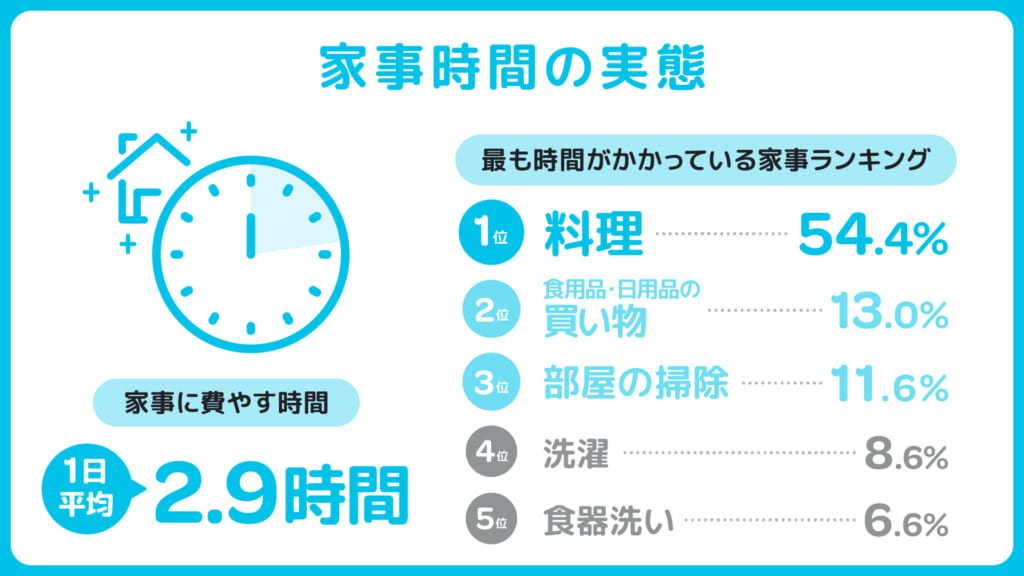
On the other hand, "Shopping for groceries and daily necessities," the second most time-consuming household chore, was selected by only 3.9% of respondents as one they do not want to do, the lowest ranking among all the chores except for "Other (1.3%). Many respondents cited the high time burden as the reason for not wanting to do shopping, rather than the mental aspect of the task, with responses such as "It takes time to travel and shop, and it is difficult to carry bulky or heavy items" and "It takes time to think about what to buy and to actually go shopping. The time required for shopping is the most important issue in household chores.
Looking at the overall results, 104 of the 697 valid responses mentioned "time" as a reason for all the chores they did not want to do, providing a glimpse of how the burden associated with modern people's chores is often tied to "time.
While more than half of the respondents feel that "the time and effort required for housework has decreased compared to the past," more than half of the respondents feel that "the time and effort required for housework has decreased compared to the past,
Less than 30 minutes" was the top response for time available for oneself, with approximately 60% of respondents feeling a lack of free time.
The time and effort required for household chores has changed with the passage of time, such as the evolution of services (food delivery, housekeeping support, etc.) and home appliances.More than half (52.4%) feel that they have less time and effort to do housework than in the past.The factors behind this result were as follows. The top factors cited were fully automatic washing machines (63.8%), fully automatic dishwashers (43.6%), and fully automatic vacuum cleaners (cleaning robots) (36.8%).
On the other hand, at home during the dayThe most common response was "less than 30 minutes (27.0%)" of free time available for themselves. 59.3% respondents feel that they do not have enough free time.The results of the survey showed that the main issue facing people today is time, rather than effort, in housework.
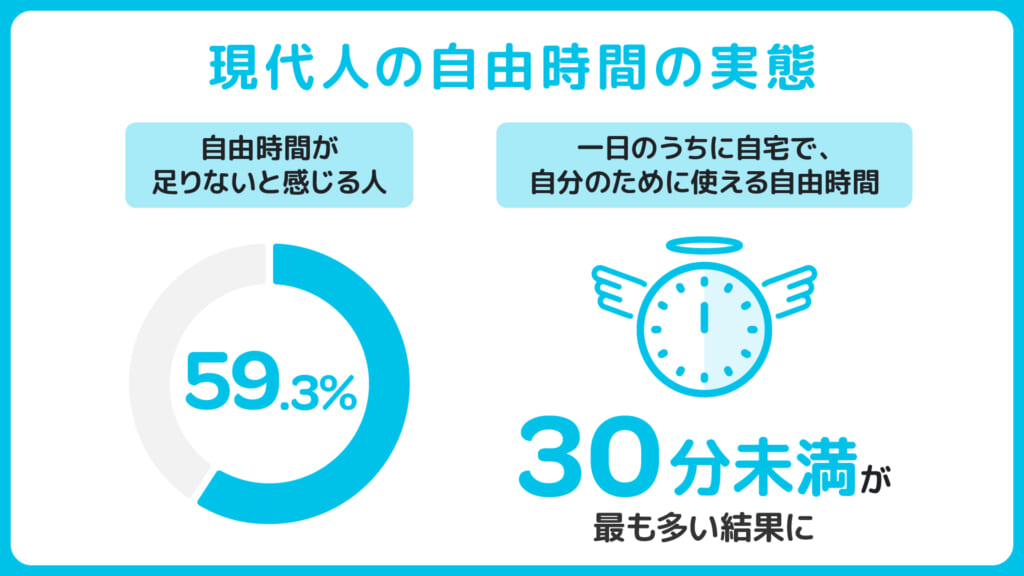
Top 3 things they would like to do if they had an hour of free time: "Slacking and relaxing," "Hobbies," and "Sleeping.
The average price paid for an hour of leisurely time at home is 1,564 yen, and the average price increases to 2,794 yen when busy!
Free from housekeeping tasks,If you had one hour of free time, what would you like to do?I just asked theHobby(56.1%)"and "Study/self-investment (27.9%)" were ranked first, ahead ofSloppy and leisurely(62.3%)"This was the result.
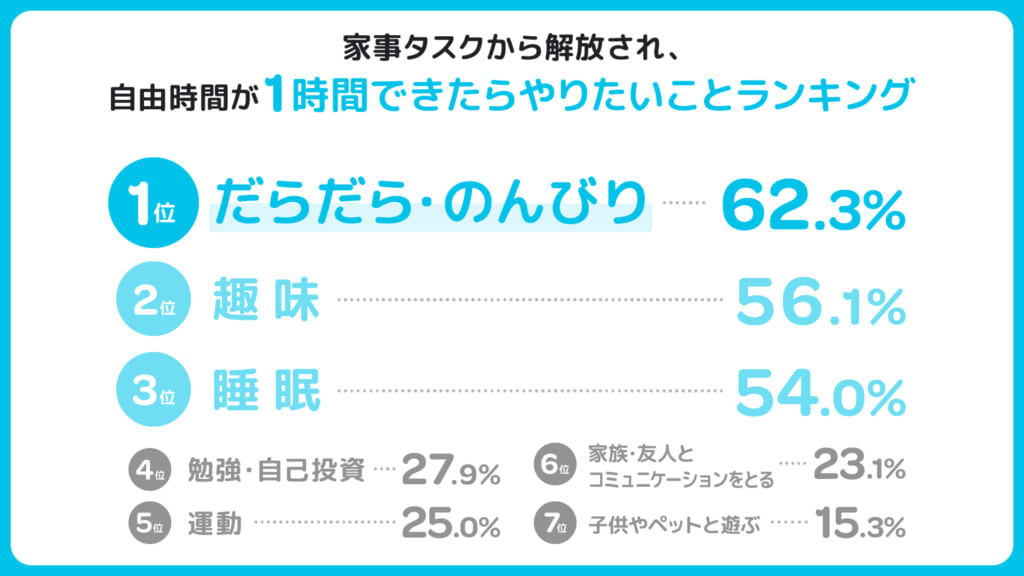
Further,If you get one hour to "slack off and relax" at home, the maximum amount you would pay in compensationThe average amount of the average is1,564 yen during regular hours, 2,794 yen during peak season.The result is a clear indication that many people in today's society, where free time is scarce, are seeking time to slack off and relax. In today's society, where free time is scarce, it is clear that many people are looking for time to relax and take it easy.
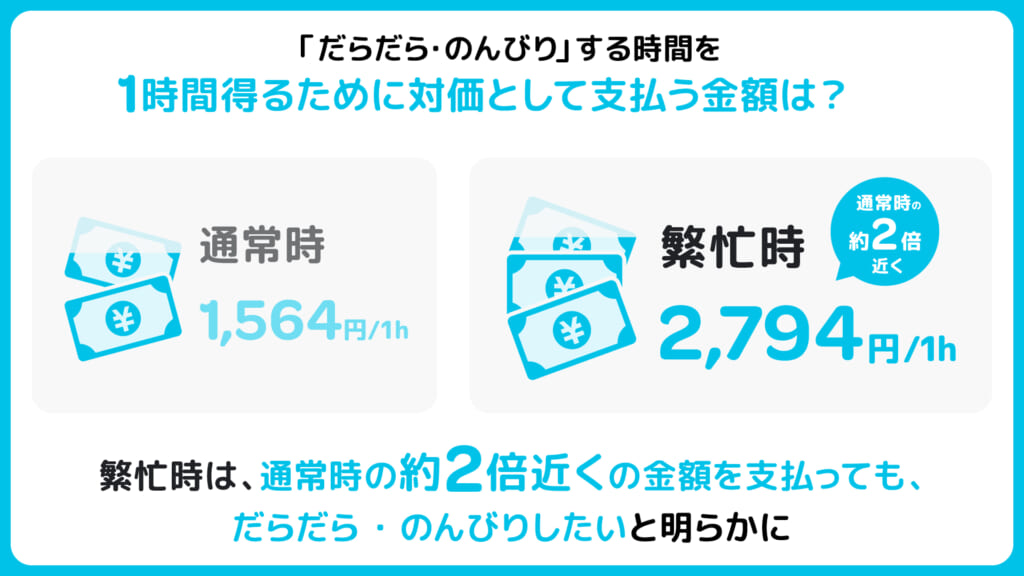
Appendix
Incidentally... A comparison of "What I would like to do if I had an hour of free time" by gender and age reveals differences in values. Men's priorities tended to differ by generation, especially among those in their 20s and 30s, with votes split among "study and self-investment," "hobbies," "sleep," "exercise," and so on. OverallIntention to be "lazy and take it easy" increases with age, especially among women in their 30s to 50s (more than 70%).The company was
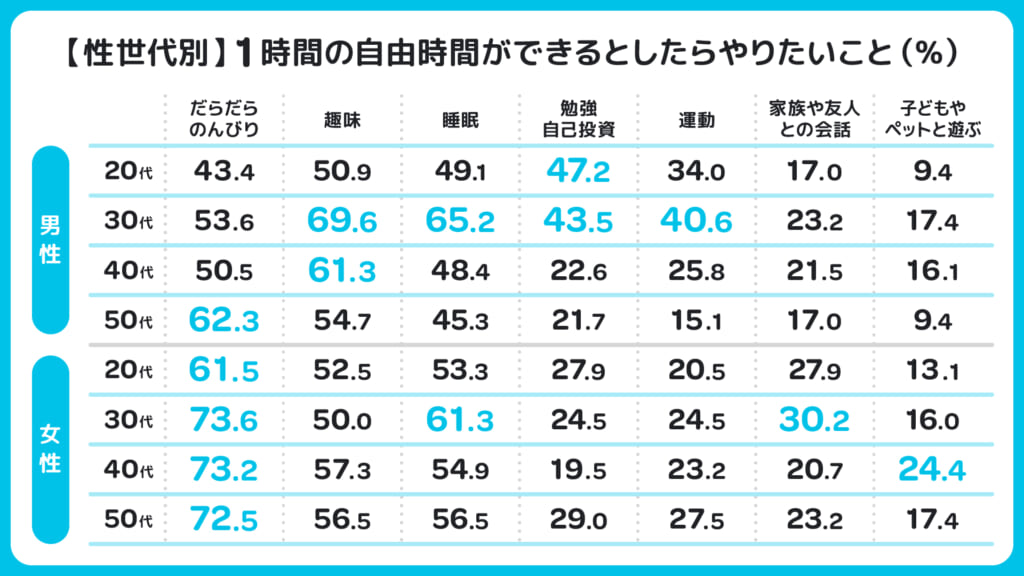
On the other hand, looking at the total time spent on housework per day by age group, men spend around 2 hours (average 1.9 hours) for all generations, while women spend over 3 hours (average 3.7 hours) for all generations, approximately twice the burden,In today's society, women, who still tend to have a high housework burden, are more likely to seek "lazy and leisurely" time.The following is a brief description of the situation.
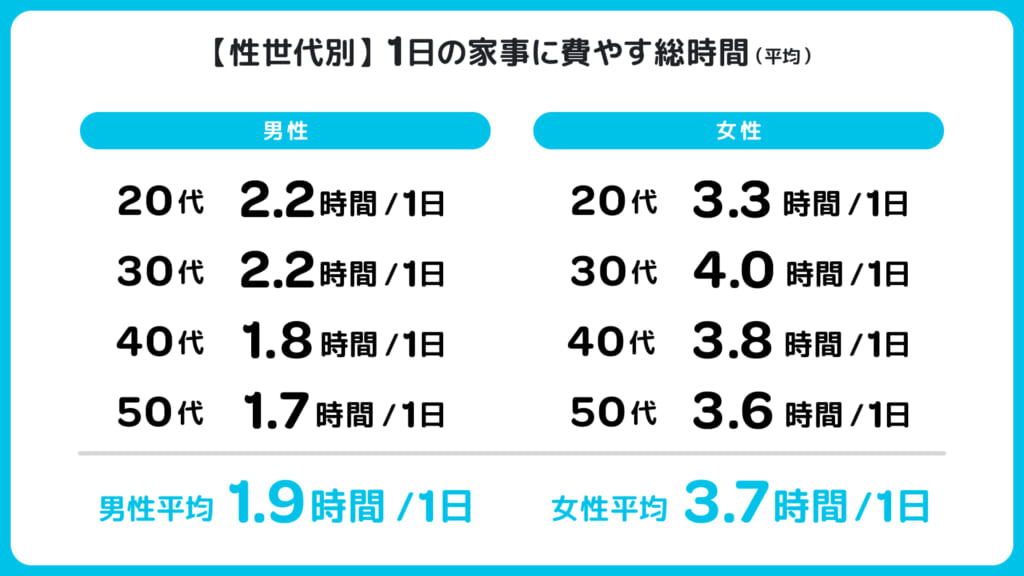
Approximately 20% are utilizing Q-commerce.
Many use it for time-saving purposes as well as for labor, with about 15% of respondents choosing "all daily shopping!
Groceries, daily necessities, etc.Instant delivery (Q-commerce*) utilization statusI just asked the23.0% are "making use of it."I responded.Why Utilize Q-Commerce?are "Difficulty in carrying luggage (49.1%)" and "Going out is a hassle (41.6%)".In addition to the purpose of reducing laborand "want to relax (31.1%)" and "have time constraints (23.61 TP7T),Many people use it for the purpose of securing time.It was seen.
On the other hand, when those who do not use Q-commerce were asked why they do not use it, the most common reason was "high delivery costs (46.2%)," followed by "limited delivery area (22.8%)" and "troublesome membership registration (13.9%).
In addition to scenes such as bad weather or poor health, respondents also use Q-commerce when they want to "slack off or relax" (32.3%), which was revealed as their intention in this survey. It was also found that 14.31 TP7T of respondents use Q-commerce for "all daily shopping".
*Q Commerce: A service that receives orders from e-commerce sites and smartphone applications and delivers groceries and daily necessities in a short period of time.
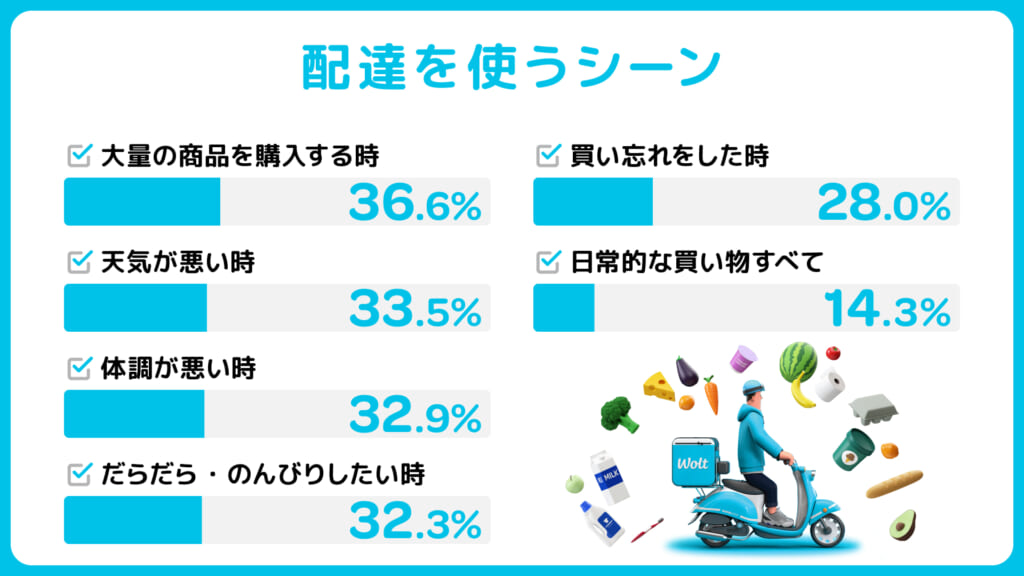
Wolt Comments
From this survey, it is clear that time is a major factor in the household chores of 2021 Japanese families. In particular, the reality that many people have less than 30 minutes of free time per day at home is one of the issues that Wolt must contribute to solving. Some people cited the cost burden of delivery fees as a hurdle to using delivery services, but as the survey highlighted, the time spent slacking off and relaxing is worth more than 1,500 yen. We hope you will take advantage of Wolt's delivery service to suit your lifestyle.
Outline of the "Wolt for a Shorter Time Campaign
Period: Tuesday, May 28, 2024 - Wednesday, August 31, 2024
Description: 1,000 discount x 3 times off your first order at participating supermarkets, convenience stores, drugstores, and other stores for groceries and daily necessities.
Promo Code: Walt Dejitan
The code entry isthis way (direction close to the speaker or towards the speaker)
Find a store near you:https://wolt.com/ja/jpn/sapporo/stores
Notes:
*For first-time orders at participating grocery and household products stores, you must enter the code from your profile page before placing your order in order for the discount to be applied.
*Codes may be entered until August 31, 2024 and may be used for 30 days from entry.
Discounts are applied when the total price of the product, excluding delivery and service charges, is ¥2,300 or more.
See also the following hashtag on social media for examples of usage.
#Wolt #Wolt Shopping in #Wolt #Wolt Time-saving #Wolt Delivery #Wolt Shopping on behalf of #Wolt
Life with #Wolt #Wolt Delivery # Delivery Service
About Wolt
Wolt is a Helsinki-based technology company that creates opportunities to meet with popular and well-loved local restaurants and stores and provides fast delivery services for goods. Founded in 2014, Wolt has established a 2022 partnership with DoorDash, which currently operates in 29 countries around the world, 25 of which operate under Wolt's products and brand, Wolt's products and brands.
Wolt's "Q-Commerce (Immediate Delivery)
Wolt focuses on "Q-commerce" (immediate delivery), delivering retail items such as groceries and daily necessities within 30 minutes of placing an order, with the Wolt app and website making it easy to order at the touch of a button, This allows you to improve your time performance on busy days or to shop when you are not feeling well.






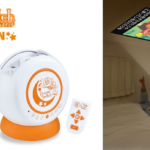




Summary of Survey Results
Facts about Housework
Actual time spent on housework
Intentions about free time
Actual utilization of Q-commerce